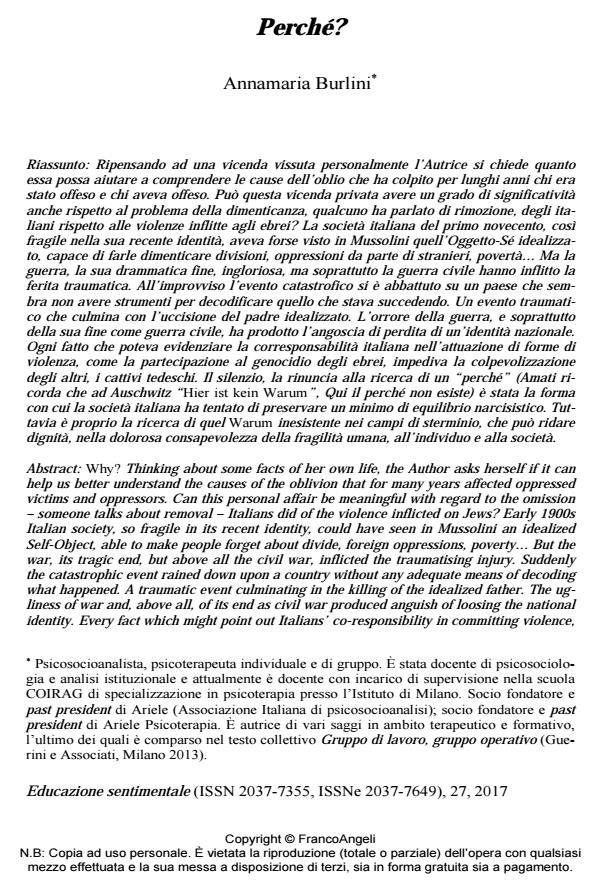Perché?
Journal title EDUCAZIONE SENTIMENTALE
Author/s Annamaria Burlini
Publishing Year 2017 Issue 2017/27 Language Italian
Pages 6 P. 112-117 File size 146 KB
DOI 10.3280/EDS2017-027008
DOI is like a bar code for intellectual property: to have more infomation
click here
Below, you can see the article first page
If you want to buy this article in PDF format, you can do it, following the instructions to buy download credits

FrancoAngeli is member of Publishers International Linking Association, Inc (PILA), a not-for-profit association which run the CrossRef service enabling links to and from online scholarly content.
Why? Thinking about some facts of her own life, the Author asks herself if it can help us better understand the causes of the oblivion that for many years affected oppressed victims and oppressors. Can this personal affair be meaningful with regard to the omission - someone talks about removal - Italians did of the violence inflicted on Jews? Early 1900s Italian society, so fragile in its recent identity, could have seen in Mussolini an idealized Self-Object, able to make people forget about divide, foreign oppressions, poverty. But the war, its tragic end, but above all the civil war, inflicted the traumatising injury. Suddenly the catastrophic event rained down upon a country without any adequate means of decoding what happened. A traumatic event culminating in the killing of the idealized father. The ugliness of war and, above all, of its end as civil war produced anguish of loosing the national identity. Every fact which might point out Italians’ co-responsibility in committing violence, as participation to the genocide of the Jews, avoided the blame of the others, the evil Germans. The silence, the surrender of the search for a "why" (Amati remembers that in Auschwitz "Hier ist kein Warum", Here there is no why) was the way the Italian society tried to maintain a minimum of narcissistic balance. However the research of that Warum non-existent in death camps is precisely what can return dignity, in the painful knowledge of the human fragility, to individuals and society.
Keywords: Identity, dis-identity, trauma, social catastrophe, thought arrest, denial pact.
- Auerhahn N.C., Prelinger E. (1983). Repetition in the Concentration Camp Survivors and her Child. International Review of Psycho-analysis, 10, 31-45.
- Aulagnier P. (1975). La violence de l’interpretation. Du pictogramme à l’enoncé. Paris: PUF. DOI: 10.4324/9780203361290
- Bauman Z. (2003). Intervista sull’identità. A cura di Vecchi B. Roma-Bari: Laterza.
- Bleger J. (1972). Simbiosi e ambiguità. Loreto: Ed. Lauretana, 1994.
- de Polo R. (2013). La psicoterapia psicoanalitica: un’archeologia del futuro. Milano: FrancoAngeli.
- Lifton R. (1976). Observations on Hiroschima Survivors. In: Krystal H. (ed.), Massive Psychic Trauma. New York: International Universities Inc.
- Puget J., Kaës R. et al. (1994). Violenza di stato e psicoanalisi. Napoli: Guido Gnocchi Ed.
Annamaria Burlini, Perché? in "EDUCAZIONE SENTIMENTALE" 27/2017, pp 112-117, DOI: 10.3280/EDS2017-027008